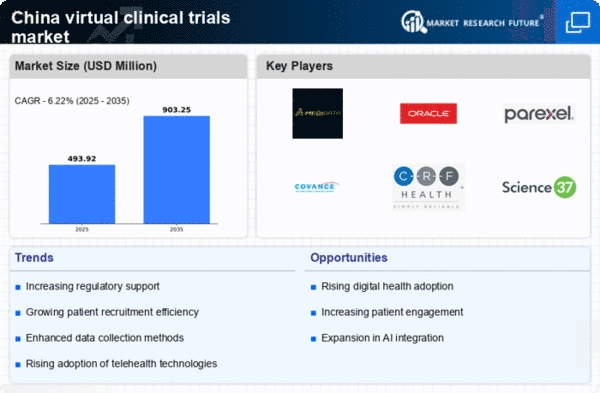Increased Patient Engagement
The virtual clinical-trials market in China is witnessing a surge in patient engagement, which is becoming a critical driver for the industry. As patients become more informed and proactive about their health, they are increasingly seeking participation in clinical trials that offer convenience and flexibility. Recent surveys indicate that nearly 70% of patients express a preference for virtual trials due to their ability to participate from home. This shift in patient attitudes is prompting sponsors to adopt virtual methodologies that cater to these preferences. Enhanced patient engagement not only improves recruitment rates but also contributes to higher retention rates in trials. Consequently, the virtual clinical-trials market is likely to expand as it aligns with the evolving expectations of patients, who are now more inclined to participate in studies that prioritize their convenience and comfort.
Evolving Regulatory Frameworks
The regulatory landscape for clinical trials in China is evolving, which is having a profound impact on the virtual clinical-trials market. Recent reforms aimed at simplifying the approval process for clinical trials are encouraging the adoption of virtual methodologies. As of November 2025, regulatory bodies have introduced guidelines that support the use of digital tools in trial management, thereby reducing barriers to entry for sponsors. This evolving framework is likely to foster innovation and encourage more companies to explore virtual trial options. Additionally, the emphasis on data security and patient privacy within these regulations is expected to enhance trust among participants, further driving the growth of the virtual clinical-trials market. As regulations continue to adapt to the changing landscape, the market is likely to see increased participation from both domestic and international stakeholders.
Government Initiatives and Funding
In China, government initiatives aimed at promoting innovation in healthcare are significantly impacting the virtual clinical-trials market. The Chinese government has allocated substantial funding to support the development of digital health solutions, which includes virtual clinical trials. As of November 2025, it is estimated that government funding for health technology has increased by over 30% in the past two years. This financial backing not only encourages the adoption of virtual trials but also fosters collaboration between public and private sectors. Such initiatives are likely to enhance the infrastructure necessary for conducting virtual trials, thereby improving the overall efficiency and effectiveness of clinical research. The virtual clinical-trials market stands to gain from these supportive policies, which aim to streamline regulatory processes and promote innovative trial designs.
Rising Demand for Decentralized Trials
The virtual clinical-trials market in China is experiencing a notable increase in demand for decentralized trials. This shift is largely driven by the need for more flexible and accessible trial designs that cater to diverse patient populations. As of November 2025, approximately 60% of clinical trials in China are adopting decentralized methodologies, which allow for remote patient monitoring and data collection. This trend is particularly relevant in urban areas where patients may have limited access to traditional trial sites. The virtual clinical-trials market is thus positioned to benefit from this growing preference, as it aligns with the broader healthcare trend of enhancing patient engagement and participation. Furthermore, the integration of digital health technologies is likely to facilitate this transition, making it easier for sponsors to conduct trials that are both efficient and patient-friendly.
Technological Integration in Healthcare
The integration of advanced technologies in healthcare is a pivotal factor influencing the virtual clinical-trials market in China. Innovations such as artificial intelligence, machine learning, and telemedicine are being increasingly utilized to enhance trial design and execution. As of November 2025, it is estimated that over 40% of clinical trials in China are leveraging AI for data analysis and patient recruitment. This technological integration not only streamlines processes but also improves the accuracy and reliability of trial outcomes. Moreover, the use of mobile health applications is facilitating real-time data collection and patient monitoring, which are essential components of virtual trials. The virtual clinical-trials market is thus poised for growth as these technologies continue to evolve and become more widely adopted within the healthcare ecosystem.
















